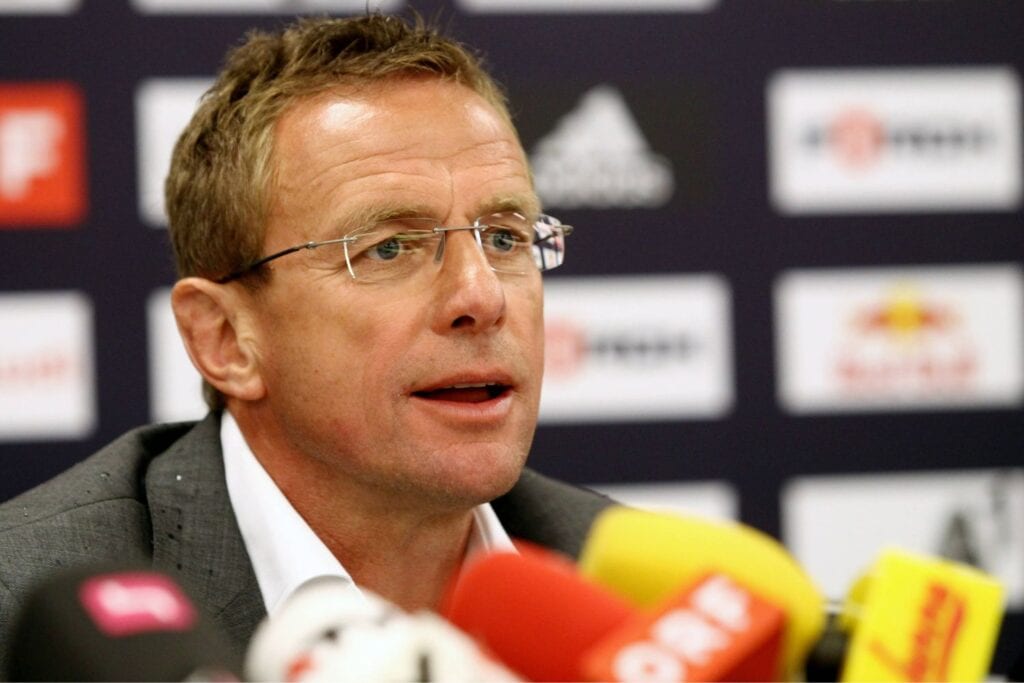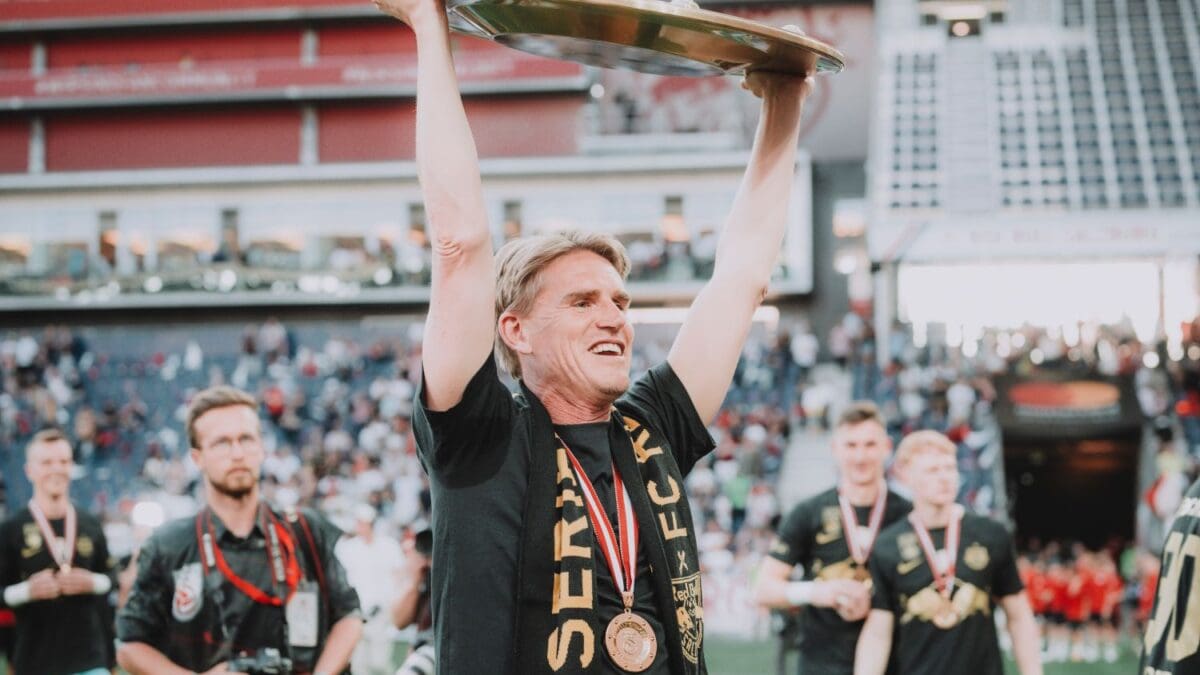Anna beantwortet in ihrer dreitiligen Serie “Strategist, carpenter, party animal” wie Christoph Freund, zum wohl gefragtesten Sportdirektor Europas geworden ist. Im ersten Teil dreht sich alles um seine Vergangenheit als Sohn eines Tischlers, familiäre Rückschläge und seinen Mentor Ralf Rangnick.
FC Bayern have finally found a replacement for the departed Hasan Salihamidžić, and surprisingly, without any prior rumors or hints, they turned to Christoph Freund. The 46-year-old Austrian, a former protégé of Ralf Rangnick, has spent his entire career at the same club. What is the legacy that he’s leaving behind, why is right here and right now the perfect time for him to actually leave the main project of all his life, and what can Bayern expect? Let’s have a detailed look.
The son of a carpenter

In fact, Christoph Freund was never supposed to be where he is now. The son of a carpenter, he grew up preparing to one day inherit the family workshop in the tiny mountain village of Leogang, about an hour’s drive from Salzburg. In his free time from learning the craft, he pursued the less popular of the two available pastimes in the region: football, which, unlike skiing, did not have such colossal popularity but still gathered its audience. First, at the nearby club ESV Saalfelden, and then at Austria Salzburg, then under the still-famous sponsor name SV Casino Salzburg. It was the zenith of one of the most well-known clubs in the country: the first team was in the form of their lives and even reached the UEFA Cup final in 1994, losing to Inter over two legs.
Freund witnessed the golden years of the main club of the city of Salzburg from the inside: by being a part of youth teams of various age groups and the reserves, and by going to the stands of the Lehener Stadion to watch the first team when he could. One day, he was even called to play in a friendly with the first team during pre-season under the guidance of the legendary coach Otto Baric. Even now, almost thirty years later, he fondly recalls that day – the fondness for that Austria, which he carried through the years, would serve as the backdrop for many of his principles and choices later on.
A stroke of fate changed everything
However, Freund’s career did not reach great heights: he never rose above the second-tier division with Swarovski Wattens, serving back then as the reserve team for the multifaceted and thousand-named FC Tirol, the club with probably the most non-linear history in the country, and SC Untersiebenbrunn on the same level of the pyramid. At the age of 24, he had to abandon his dreams of a decent professional career altogether, when the sudden death of his father, Gottfried Freund, in 2002 forced him to return to Leogang and learn to manage the already expanded small carpentry workshop on the fly. At first, he handled everything alone – only after a year, management was handed over to someone with more managerial experience. But the “learning by doing” principle became a part of his philosophy as early as then.
And then came 2005, a massive turning point for Austrian football as a whole. The Red Bull takeover left a huge impact on the local football scene and the community around Austria Salzburg. The club was saved from imminent implosion, but the measures and decisions accompanying the takeover were not welcomed by the supporters. After a series of intense talks and attempts to push for compromises, the vast majority of the fans turned away from the club. However, a small fraction of those who still saw the club they loved and supported behind the drastic changes decided to give this process a chance. Christoph Freund found himself among this small group.
From admin tasks to sports coordinator
He joined the club’s structure – or rather returned to the club a decade after – in 2006, the second year of the Red Bull era. Initially, his role as team administrator consisted simpler tasks, but over the years, his responsibilities expanded to include more serious matters such as handling documents, contracts, and human resources. In the winter of 2012, he was promoted to sports coordinator, but real changes still waited ahead.
Teacher Rangnick. Student Freund

2012 became a milestone for the club connected to one precise name: Ralf Rangnick. By that time, the whole Red Bull Salzburg project was stuck in a prolonged identity crisis. The initial dreams of creating a “European super club in the Alps able to bring the Champions League to the outskirts of Salzburg” had shattered against harsh reality several years ago. Big stars were reluctant to come along, the club struggled year after year to qualify for the Champions League (public word quickly dubbed it a curse for what has been done to the legacy of Austria Salzburg), and the constant carousel of coaches instilled despair and demonstrated a complete lack of clear development strategy. In the first few weeks of Rangnick’s presence, the club became the laughingstock on an international scale: the loss to Luxembourg’s Dudelange in the Champions League qualification still remains one of the most embarrassing pages in Austrian football history. After this debacle, Rangnick left no stone unturned: in just a few weeks, he completely rebuilt the squad to fit Roger Schmidt’s playing ideas, which laid the foundation for the now recognizable Red Bull-style (Sadio Mane, Kevin Kampl, and Valon Berisha were among the newcomers). He restructured the squad planning policy, adjusted the business model and overhauled the entire youth system. That day, July 24, 2012, started a new era for both Red Bull Salzburg and the entire Austrian league.
Christoph Freund immediately caught Rangnick’s eye, both as a capable manager with an excellent understanding of the club’s new philosophy and as a person with a deep ideological attachment to Salzburg. From the very first months, he became Rangnick’s right hand, actively participating in all the reshuffles and reforms, absorbing ideas, and sharing his own insights.
Therefore, when three years later Rangnick logically decided to shift his focus to the increasingly important RB Leipzig project that was already approaching top tiers, his successor’s name came as no surprise to anyone. At 37 years old, without a full-fledged professional career experience and a CV that only featured one club, Christoph Freund took full control of one of Europe’s most interesting projects. For the second time in his life, just like with his father’s carpentry workshop, he had to learn everything on the fly.
Passing tests
As one can easily guess, there was no shortage of skepticism. The press and fans scrutinized him during the first few months, closely examining his biography and every appearance in the media in his new role, not hesitating to express doubts about Freund’s competence. The sporting background was appropriate: Salzburg started the 2015/16 season with two losses in the league, was traditionally eliminated from the Champions League qualification by Malmö FF, then struggled in the Europa League playoffs against Dinamo Minsk and lost on penalties. The bet on coach Peter Zeidler ended up being objectively unsuccessful, making him the only coach to be fired in the middle of the season since Red Bull took over. At the same time, Freund had to work wonders with public relations to minimize the consequences of Martin Hinteregger’s booze escapades, which started making their way into the press. You wouldn’t wish such a start in a leadership position to anyone, especially when everyone is against you upfront.
Christoph Freund passed the test. By spring, after the arrival of Oscar García (a manager whose football philosophy was not that well aligned with the typical Red Bull style, but he still managed to win all the available domestic trophies with the club), things started to turn around, the situation stabilized, and the critics’ voices subsided. Since then, for seven years, Salzburg has managed to avoid major crises and turbulence – a rare occurrence in modern football.

